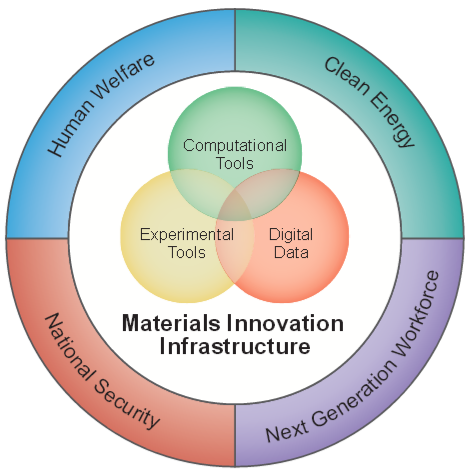‘Materials Genome Initiative’ commitments announced
June 26, 2013
 The Obama Administration and academic and industry partners have announced a series of commitments in support of the Materials Genome Initiative, a public-private endeavor that aims to cut in half the time it takes to develop novel materials that can fuel advanced manufacturing and bolster the 21st century American economy.
The Obama Administration and academic and industry partners have announced a series of commitments in support of the Materials Genome Initiative, a public-private endeavor that aims to cut in half the time it takes to develop novel materials that can fuel advanced manufacturing and bolster the 21st century American economy.
The announcements come two years to the day after President Obama launched the Materials Genome Initiative (MGI), committing the Federal Government to work with industry and academic researchers to double the pace of development of advanced materials to meet a range of national goals. These incliude vehicles that are safer and more fuel efficient, packaging that keeps food fresher and more nutritious, vests that better protect our soldiers, and metals that can tolerate extreme temperatures and radiation for use in spacecraft and satellites.
The MGI, overseen by the White House Office of Science and Technology Policy, helps to coordinate Federal materials science research across multiple agencies and encourages private-sector and academic researchers to develop and share basic materials science discovery data to speed innovation — much as geneticists accelerated the Human Genome Project by openly sharing basic DNA sequence data.
The Administration and a number of private-sector partners announced several new commitments :
NIST to Create New Center of Excellence in Support of MGI: The Commerce Department’s National Institute of Standards and Technology (NIST) is committing $25 million over 5 years to form a Center of Excellence on Advanced Materials. Only the second center of excellence in NIST history, it will create a collaborative environment and concentration of technical capability to accelerate materials discovery and development. NIST will also collaborate with ASM International and its Computational Materials Data Network to establish an open, digital repository of materials data.
Universities to Build a Materials Innovation Accelerator Network: In support of MGI goals, the University of Wisconsin, Madison, and the Georgia Institute of Technology are creating new Institutes in materials innovation with collective investments totaling ~$15 million while the University of Michigan has committed to invest an additional $20 million MGI programs already underway. Moreover, all three universities will partner to launch a nationwide dialogue and begin work toward building a nationwide materials innovation accelerator network to better connect with other centers, institutes, future efforts, and MGI-related activity.
Public-Private Collaboration to Move Materials to Market Faster: Lawrence Berkeley National Laboratory (LBNL), Massachusetts Institute of Technology, and Intermolecular, Inc., are working together to more accurately predict material behavior with software tools made openly available by LBNL. Building on data from existing high-throughput combinatorial experimentation and simulation, researchers anticipate a set of tools that could increase the speed of new materials development ten-fold or more over conventional approaches.
Data on Millions of Materials to be Made Freely Available: Harvard University and IBM are releasing a freely available and open database describing 2.3 million new materials for potential use in solar cells – the largest open-access effort of its kind. Greater sharing of basic materials data is a core principle of the MGI, and these newly available data are expected to advance the development of a range of organic, electricity-generating devices, including some that could be coated, painted, or sprayed on roofs, windows, walls, and portable devices.
New Commitments in Education: Building on pledges made by more than 60 companies and universities last year to advance the MGI, seven more academic institutions and a software company are announcing new educational efforts around MGI that include curricula development, new graduate degrees, and research opportunities. For example, MIT is launching a new massive open online course (MOOC) focusing on innovation and commercialization with new materials.
These new commitments build on support from the five participating MGI agencies—the National Science Foundation, Department of Defense, Department of Energy, NASA, and NIST—which in FY 2012 made more than 70 awards to support MGI-related research totaling nearly $63 million. The academic and private sectors has responded in kind, with more than 60 universities and companies committing to advance the MGI through their education and research practices—including the public release of databases of materials properties and partnerships between universities, industry, and national labs.
“Whether we’re talking about high-efficiency, high-temperature jet engines, solar cells that generate electricity as inexpensively as coal, wind turbines that use magnets free of rare-earth elements, or the biocompatibility of replacement joints and implants, materials matter,” said Dr. Cyrus Wadia, Assistant Director for Clean Energy and Materials R&D in the White House Office of Science and Technology Policy. “The Materials Genome Initiative is catalyzing important collaborative advances from industry, academia, and the Federal Government, so that together we can secure the nation’s future as a leader in this critical technological domain.”
